- Home
- Michael Wallace
The Crescent Spy Page 4
The Crescent Spy Read online
Page 4
“That was a clever game you played, Mr. Pinkerton,” Josephine said. “You had me convinced.”
“It was Mr. Gray’s idea.”
“Where is the president?”
Pinkerton waved his pipe. “Meeting with the secretary of war. He’ll come in when he finishes. Meanwhile, we have a few items of business to attend to.”
“Such as?”
He reached beneath the table and removed a carpetbag, which he set on the table next to Gray, who unfastened the clasp but didn’t open it. Josephine resisted the urge to stare or ask questions, knowing that it would be easy to lose whatever power over the situation she still possessed.
“Did you meet with Jeff Davis when you were in Richmond?” Pinkerton asked.
She raised her eyebrows. “Again? Aren’t we finished yet with the suspicion?”
“Please answer the question,” Gray said.
“Of course I did. You read the article—you saw what Davis said. I didn’t invent those quotes.” She fixed each of the men in turn. “But I’m no spy. If this is what you think, say it, I’ll depart at once.”
“In the first place, nobody thinks you’re a spy,” Pinkerton said. “In the second, there’s nowhere to go—you’re finished in Washington. We’ve made sure of that. Now you have a chance to prove your mettle, that you really mean the loyalty oath.” He glanced at his companion. “Did she take it?”
Gray nodded. “She did.”
Josephine crossed her arms. “I told you, I’m not a spy. Not for the Confederates, and not for you, either. I’ll listen to what you have to say, but if that’s what you’re asking, you can toss those hopes out the window. I won’t spy.”
Pinkerton smiled. “Not even to return to New Orleans?”
She blinked. This was not what she was expecting, and she didn’t know how to answer the question. She wasn’t sure she wanted to go back. In the first year she had missed the river and the delta with an aching all the way to her bones. Last spring, a traveling exhibition named Panorama of the Mighty Mississippi had come to Washington. The panorama was a three-hundred-foot-long, ten-foot-high canvas that scrolled past with painted scenes of the Mississippi: deer and buffalo at the water’s edge, Indians in canoes, the ruins of the failed Mormon city at Nauvoo, Illinois. As the canvas moved, a narrator explained to the enraptured audience what they were viewing. All were scenes she had witnessed, and while the painting quality was as poor as one could expect from such a vast, workmanlike scene, it was still close enough to her childhood that she had to get up and leave the theater because she was so overwhelmed with memories, both happy and painful.
“I’m not exactly from New Orleans,” she said.
“That is part of the reason we’re interested in you,” Pinkerton said. “You know the city, but you don’t have all of the relationships that might trip you up. And you know the river, which is our specific concern.”
“What makes you say that?” she said warily.
“Didn’t you grow up on a Mississippi riverboat?”
Josephine thrust out her chin. “And what of it?”
Pinkerton nodded at Gray, and the younger agent opened the carpetbag. He removed a few papers with handwritten notes, and a stack of telegrams on American Telegraph Company cards. Then he removed a black-lacquered box with a scene of a landscape chiseled into the red-and-green-painted lid. The scene was a grand harbor, lined with jagged mountains and filled with Chinese junks.
She sprang to her feet and reached across the table. “Give me that!”
Gray snatched it up and held it out of reach. “Calm down, Miss Breaux.”
“You stole that from my rooms!”
“We didn’t steal it,” Pinkerton said. “To maintain the fiction, we told your landlady you’d been expelled from the city. We simply collected your belongings so Mrs. Mills wouldn’t sell them.”
“That’s pure fimble-famble. That box was hidden behind the wainscot, which means you tore my rooms apart. Did you steal everything? Where’s my money?”
“Everything is here,” Gray said, “and you will get it back in due time.”
“That time is now.”
Nevertheless, she sat, fuming that her possessions had been violated, but she was still under their power, disgraced and evicted.
Gray opened the chest. He removed a stack of banknotes and set them on the table, plus a dozen twenty-dollar gold double eagles. He stacked the coins on top of each other, then ran his thumb across the banknotes.
Gray whistled, as if seeing it for the first time, although she had little doubt that these men had counted every last dollar. “That’s quite a tidy sum.”
While his fellow agent pawed over Josephine’s money, Pinkerton packed more tobacco into his pipe and relit it. “How old are you, Miss Breaux?”
“Twenty-four.”
“That is a lot of money for a young woman to possess, especially one with such an interesting background. Three thousand eight hundred dollars. Mr. Gray’s salary is six dollars a day, plus expenses. How long would one have to work and save to accumulate so much money? You have been in Washington for how long? Three years?”
“What are you driving at?”
Pinkerton puffed and cast a glance at Gray. These two men were working her over in an interrogation that was growing increasingly invasive, clearly designed to break down her protective barriers.
“We have reason to believe you are younger than you claim,” Gray said.
“I am not. Anyway, what does that matter?”
“It is suspicious enough for a woman who arrived in Washington at the age of twenty-one to be in possession of three thousand eight hundred dollars in ready money. It is another thing for a girl of eighteen to arrive with those resources.”
“And you have deduced all of this since this afternoon?” she asked. “That I am three years younger than I claim and that I arrived in Washington with this money instead of earning it here? Pretty clever work if you only just came into possession of that box. Or had you already broken into my rooms and rifled through my possessions?”
“We won’t insult your intelligence with lies,” Pinkerton said. “Of course we have been watching you for some time. Ever since Joseph Breaux interviewed Jeff Davis three weeks ago.”
“That story didn’t earn me as much attention as I had hoped,” she admitted. “People thought I was embellishing all those things Davis told me.”
“We didn’t,” Pinkerton said. “Certain details rang all too true. Once we had our eye on you, it didn’t take much digging to turn up the truth.”
“And even less work to put that weasel from the Washington Standard on the story. Which one of you did that?” She turned to Gray. “Was that you? I hope you appreciate the humiliation I suffered.”
“That was an unfortunate turn of events,” Pinkerton said. “But once it happened, we knew we had to move quickly.”
She held out her hand. “Can I have my chest back now? It’s from Shanghai and a hundred years old, and I don’t want you breaking it.”
Gray didn’t obey, but reached his hand into Josephine’s Oriental chest, and she winced, wondering what he would bring up next. She’d received that box at the age of thirteen and had stored all manner of keepsakes and mementos inside. Some had been valuable, others were merely sentimental, and several were embarrassing.
He took out two photographs and set them on the table. Josephine remembered posing for them each, remaining still for what had seemed an eternity, while the sun sent sweat trickling down her face. Then the photographer retreated to his wagon to work in darkness, emerging later, smelling of chemicals, with the picture lacquered onto tin and protected with glass cemented on top with a transparent balsam resin. That she had not one, but two photographic recollections of her childhood was unusual. That they had survived the upheavals of her life was nearly miraculous. Yet on more than one occasion she had considered smashing the glass and destroying them.
“The girl in each of these photos is yo
u?” Gray asked.
“I was an awkward child.”
“I don’t see that. But I do see a girl of nine or ten here, and perhaps thirteen in this picture.”
“And?”
“Is this woman your mother?”
Josephine looked at the picture. She’d stared at it hundreds of times, could picture it in her mind with little trouble. But she saw it now as if for the first time. A young, gawky girl of eight, standing on the deck of a riverboat steamer next to a woman in a sequined dress, who showed too much leg and wore too much face paint. The girl, jutting her chin forward, a defiant gleam in her eyes. The mother, still beautiful and glamorous and only in her midtwenties, a coquettish look on her face.
“I’m not answering the question.”
“The question doesn’t need an answer,” Pinkerton said. “The eyes are the same, as is the nose. This woman is evidently your mother. She must have been young when she had you—sixteen or seventeen.”
“She was a professional riverboat dancer. Not what you’re implying.”
“Nobody is implying anything.”
Josephine fixed her gaze on Pinkerton. “What did you say about insulting my intelligence with lies?”
The older of the two men didn’t look ashamed, merely puffed again at his pipe and nodded for his fellow agent to continue.
“And is this one your father?” Gray asked. He showed the second photo.
In this one, Josephine was older, in that awkward stage between childhood and womanhood, when she’d felt all arms and legs, like a bony scarecrow. In spite of how she looked, and what came shortly after, that had been a time that she now regretted passing. Her mind had been older, sharper, and she could understand the world, but she had not yet filled out and started drawing unwanted attention.
“Is he?” Gray pressed. “It is harder to tell if there’s a resemblance—the man’s face is blurry.”
“He’s blurry because he didn’t want to stand still. Anyway, I don’t know the answer to your question. We called him the Colonel.”
This admission hung in the air a long moment without comment. What did it say that Josephine didn’t know the answer to such a simple question? Was he, or was he not her father?
“You were traveling on a boat by the name of Cairo Red,” Gray said. “There’s plenty of evidence for it in your box—passenger tickets, a letter from your mother that mentions it—”
Josephine’s face flushed. “You read that? Have you no honor, Mr. Gray?”
For once, the man looked ashamed, and avoided meeting her gaze, but glanced instead to Pinkerton for guidance.
“Go on,” Pinkerton told the younger man.
Gray nodded and turned back to Josephine. “But the boat in the photo isn’t Cairo Red. This is a boat named Crescent Queen. We know this because Crescent Queen is currently in Memphis, being outfitted with guns to serve in the Confederate navy, and we were able to identify it.”
Josephine forced the emotion from her voice. “I lived on Crescent Queen for most of my childhood. There was trouble. The last few years I spent on Cairo Red.”
“What kind of trouble?” Pinkerton asked.
“Never mind,” she said abruptly, as more memories came to the surface, like a Mississippi eddy swirling up a dead body from the muddy depths. “My mother had an opportunity on Cairo Red, so we took it.”
“I’ve sent out inquiries about Cairo Red,” Pinkerton said. “We’re collecting information about all shipping on the river. But as of yet I have no information on the boat. Perhaps you could tell us more.”
“I’d rather not. You’ll get your answer soon enough. Suffice it to say that she is no longer sailing the Mississippi.”
“Very well. Go on, Mr. Gray,” Pinkerton urged.
Gray pointed to the second picture. “How old are you in this picture? Fourteen, perhaps?”
“More or less.”
“According to what we found in your personal effects, you were on Cairo Red as of 1854,” Gray said. “Seven years ago. So you cannot be older than twenty-one now.”
“You would make a good newspaper writer,” she said grudgingly. “If you weren’t such a scoundrel, I’d suggest you speak with Mr. Barnhart at the Morning Clarion. He is short one ace reporter.”
“How old are you now?” Pinkerton asked again. “And why are you claiming to be twenty-four?”
“I left New Orleans at seventeen, but told people that I was older so as to secure passage on a clipper without attracting attention. I kept up the fiction when I arrived in Washington City. I am twenty years old as of last month. Now are you satisfied?”
“So where did you get all the money?” Pinkerton asked. “Did you bring it with you, or acquire it in Washington?”
“I didn’t steal it, I didn’t earn it through disreputable activities, and I haven’t been paid by the enemy to serve as a spy or in any other capacity. So I don’t see how it is any of your business.”
“Miss Breaux,” Gray pressed. “If all of that is true, then what harm would it be to explain?”
“No, I’m not talking about it.”
The two agents prodded her a few more times, but she stubbornly resisted saying anything more. That would bring matters back to the Colonel and to her mother’s semireputable career and sad demise, and that was nobody’s business. She certainly wouldn’t discuss it with these two men. At last they gave it up, as she knew they would. They’d gone to a good deal of trouble to maneuver her into this position and wouldn’t change their minds because she had unexplained money.
A knock came at the door, and the two men rose quickly to their feet. Josephine followed their lead.
The president of the United States entered the room.
Abraham Lincoln stood near the door for a long moment, as if waiting for permission to enter. Josephine had seen the man occasionally walking about the White House grounds or exiting his carriage, but this was the first time she had seen him up close since a brief glimpse at the inauguration earlier in the year.
He seemed even taller and more gaunt than she’d remembered. Bags hung beneath his eyes, and lines crawled across his forehead like the picket lines of a slowly marching army. It was as if he’d aged a decade in a few short months.
“Miss Breaux?” Lincoln said. “Your mouth is hanging open wide enough to swallow a dragonfly.”
She snapped it shut, embarrassed by her gaping. She’d met plenty of generals and politicians, and even the president of the Confederacy a few weeks ago, but maybe it was the long, hot day full of reversals and the interrogation Gray and Pinkerton had already subjected her to that left her tongue-tied. She felt she needed to say something and blurted the first stupid thing that came to mind.
“You’re much taller close up.”
A smile lit up his face, and he chuckled warmly. “And you’re as slender as a willow and not much older than the Irish girl they’ve sent to iron my shirts. But if half of what they tell me is true, you’re the young lady who will help me win New Orleans.”
“Sir?”
“Mr. President—” Pinkerton said at the same time, his voice warning.
Lincoln waved a long, bony hand and sat at the far end of the table. The others sat down as well.
“If she’s as clever as Mr. Gray insisted, then she has figured out most of it already. Haven’t you, Miss Breaux?”
“What was I supposed to figure out?”
“Ah, well, perhaps they were wrong. You gentlemen did tell her about New Orleans, right?”
“Yes, sir,” Pinkerton said.
“And you questioned her about the riverboat business, or haven’t you reached that point yet?”
“We started, but she is being obstinate.” Pinkerton put away his pipe. “Except what we can pry out of her, she won’t give us any information until she has sussed out the situation.”
“A woman who bridles her mouth before she sets it agallop is precisely what we are looking for, is it not?” the president asked.
Pi
nkerton scowled. “I suppose.”
“My first question for you,” Lincoln said, turning his deep, penetrating gaze in Josephine’s direction, “is whether you want to see the slavocracy of the rebellious states win their so-called liberty?”
“Of course not. I am a Union supporter and always have been.”
“Mr. Pinkerton and Mr. Gray want you in New Orleans. Please tell me why. I’d like to find out if you’re as clever as you seem from your writing, or if someone else has been penning your stories.”
She bristled at this, even as she knew he was saying it to goad her into defending her intellect. She only just avoided blurting her thoughts. But one of the first lessons of journalism was that if you wanted information, you should let the other fellow do all of the talking. And she desperately wanted information.
After a few seconds of silence, Lincoln sighed. “You have either been overestimated or underestimated. I cannot quite decide which.”
Her pride was eating at her, so she turned toward something else that might prove her quality. “I can tell you why you lost the battle at Bull Run.”
“I beg your pardon?” the president said, blinking.
The president’s two agents exchanged glances. “I hardly think you’re qualified to give military advice,” Pinkerton said.
“The rebels boast that every Southerner is worth ten Yankees,” Josephine said. “But that’s not what I saw on the battlefield. The Union boys were every bit as brave as the enemy. It was only when Union leadership failed that the common soldier turned tail and fled.”
“So the problem was our generals?” Lincoln asked. “Is that your claim? That their officers are more intelligent than ours, better versed in the art of war?”
“I wouldn’t even say that. I met Beauregard when I came in to inspect his army. He was easily fooled, and I didn’t get the impression he was any more clever than your average congressman.”

 Crowlord (The Sword Saint Series Book 2)
Crowlord (The Sword Saint Series Book 2) Crowlord
Crowlord The Red Sword- The Complete Trilogy
The Red Sword- The Complete Trilogy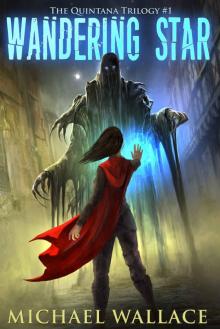 Wandering Star (The Quintana Trilogy Book 1)
Wandering Star (The Quintana Trilogy Book 1)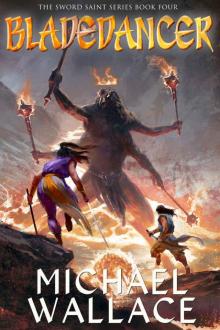 Bladedancer
Bladedancer Sword Saint
Sword Saint The Alliance Trilogy
The Alliance Trilogy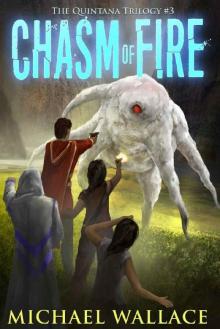 Chasm of Fire
Chasm of Fire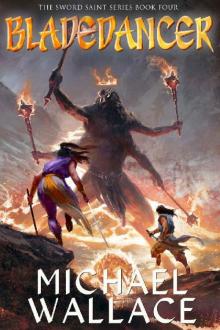 Bladedancer (The Sword Saint Series Book 4)
Bladedancer (The Sword Saint Series Book 4) The Devil's Deep
The Devil's Deep Shadow Walker (The Sword Saint Series Book 3)
Shadow Walker (The Sword Saint Series Book 3) Starship Blackbeard
Starship Blackbeard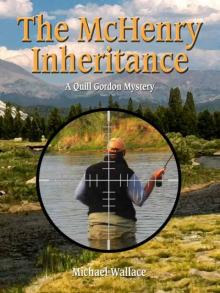 The McHenry Inheritance (Quill Gordon Mystery Book 1)
The McHenry Inheritance (Quill Gordon Mystery Book 1) Sun King (The Void Queen Trilogy Book 3)
Sun King (The Void Queen Trilogy Book 3)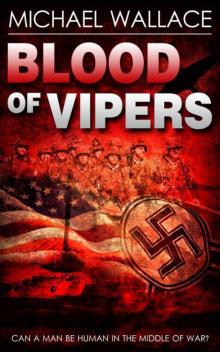 Blood of Vipers
Blood of Vipers Righteous - 01 - The Righteous
Righteous - 01 - The Righteous I Scarce Can Die (Quill Gordon Mystery Book 5)
I Scarce Can Die (Quill Gordon Mystery Book 5)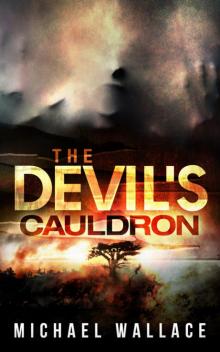 The Devil's Cauldron
The Devil's Cauldron The Wicked (The Righteous)
The Wicked (The Righteous) Crow Hollow
Crow Hollow Righteous03 - The Wicked
Righteous03 - The Wicked Righteous02 - Mighty and Strong
Righteous02 - Mighty and Strong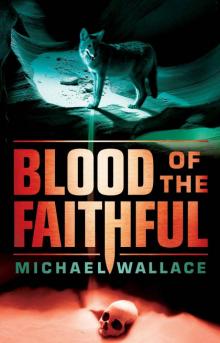 Blood of the Faithful
Blood of the Faithful Wash Her Guilt Away (Quill Gordon Mystery Book 2)
Wash Her Guilt Away (Quill Gordon Mystery Book 2) The Kingdom of the Bears
The Kingdom of the Bears The Emerald Crown (The Red Sword Trilogy Book 3)
The Emerald Crown (The Red Sword Trilogy Book 3) The Dark Citadel
The Dark Citadel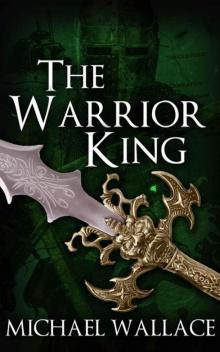 The Warrior King (Book 4)
The Warrior King (Book 4) Rebellion of Stars (Starship Blackbeard Book 4)
Rebellion of Stars (Starship Blackbeard Book 4) Righteous04 - The Blessed and the Damned
Righteous04 - The Blessed and the Damned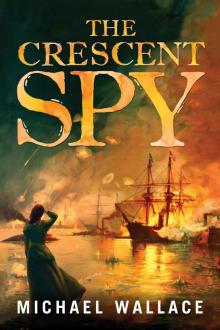 The Crescent Spy
The Crescent Spy Queen of the Void (The Void Queen Trilogy Book 1)
Queen of the Void (The Void Queen Trilogy Book 1)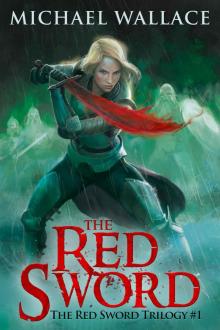 The Red Sword (The Red Sword Trilogy Book 1)
The Red Sword (The Red Sword Trilogy Book 1) The Sentinel (The Sentinel Trilogy Book 1)
The Sentinel (The Sentinel Trilogy Book 1)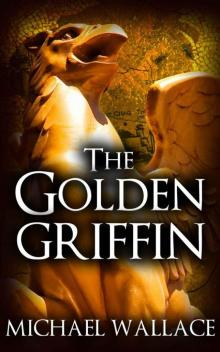 The Golden Griffin (Book 3)
The Golden Griffin (Book 3) The Blessed and the Damned (Righteous Series #4)
The Blessed and the Damned (Righteous Series #4) Hell's Fortress
Hell's Fortress Not Death, But Love (Quill Gordon Mystery Book 3)
Not Death, But Love (Quill Gordon Mystery Book 3) Destroying Angel
Destroying Angel The Free Kingdoms (Book 2)
The Free Kingdoms (Book 2) Dragon Quadrant (The Sentinel Trilogy Book 2)
Dragon Quadrant (The Sentinel Trilogy Book 2) Shattered Sun (The Sentinel Trilogy Book 3)
Shattered Sun (The Sentinel Trilogy Book 3) The Wolves of Paris
The Wolves of Paris Lords of Space (Starship Blackbeard Book 2)
Lords of Space (Starship Blackbeard Book 2) Dreadnought (Starship Blackbeard Book 3)
Dreadnought (Starship Blackbeard Book 3) The Village of Dead Souls: A Zombie Novel
The Village of Dead Souls: A Zombie Novel The Black Shield (The Red Sword Book 2)
The Black Shield (The Red Sword Book 2) The Daughters Of Alta Mira (Quill Gordon Mystery Book 4)
The Daughters Of Alta Mira (Quill Gordon Mystery Book 4) Mighty and Strong (The Righteous)
Mighty and Strong (The Righteous)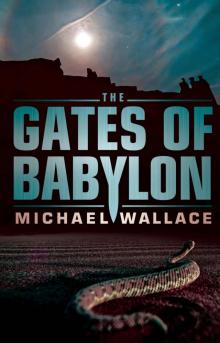 The Gates of Babylon
The Gates of Babylon